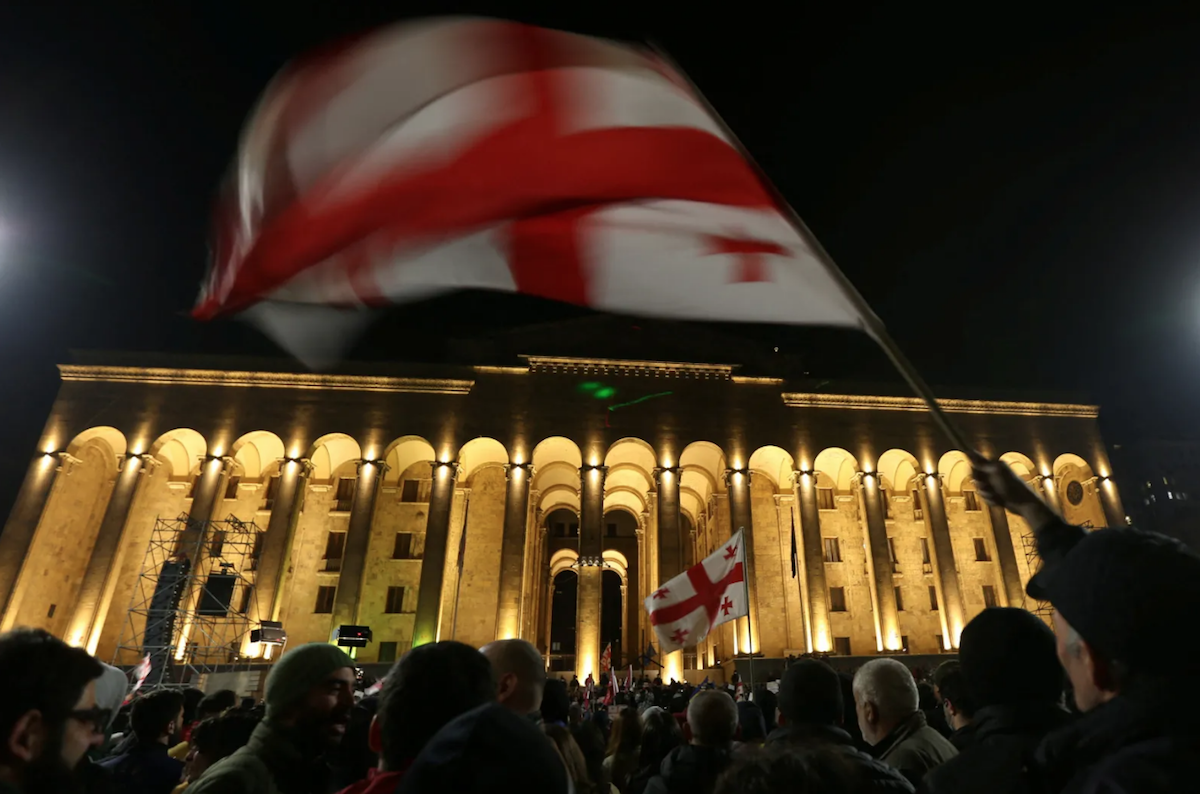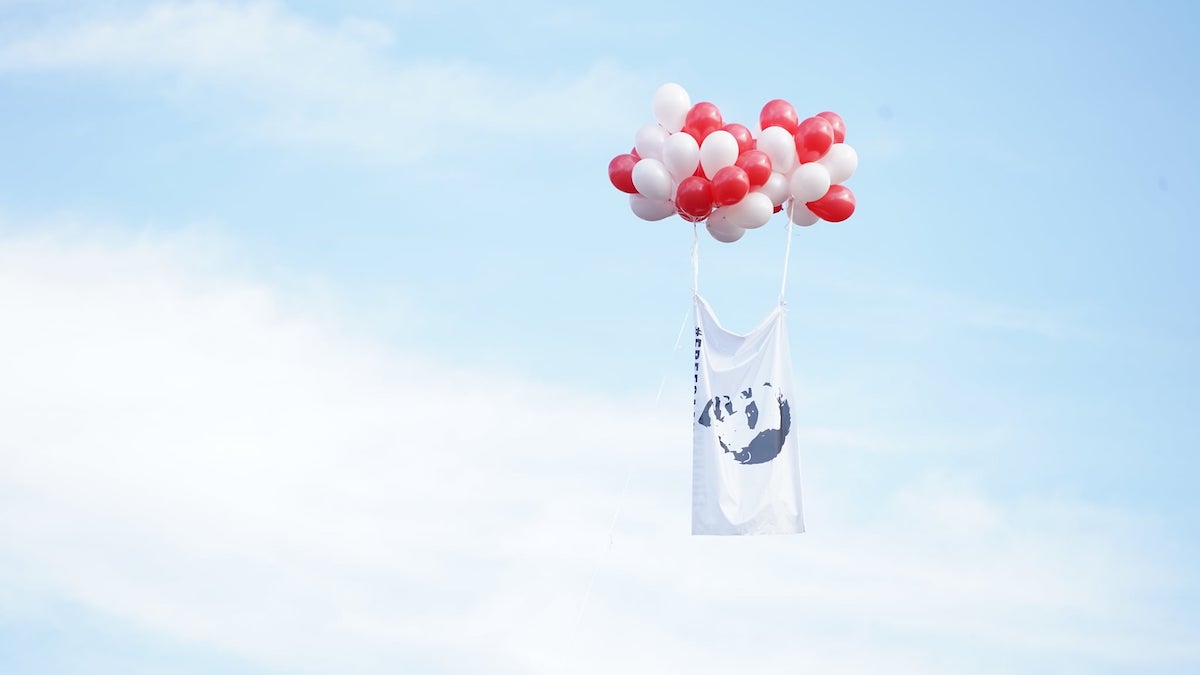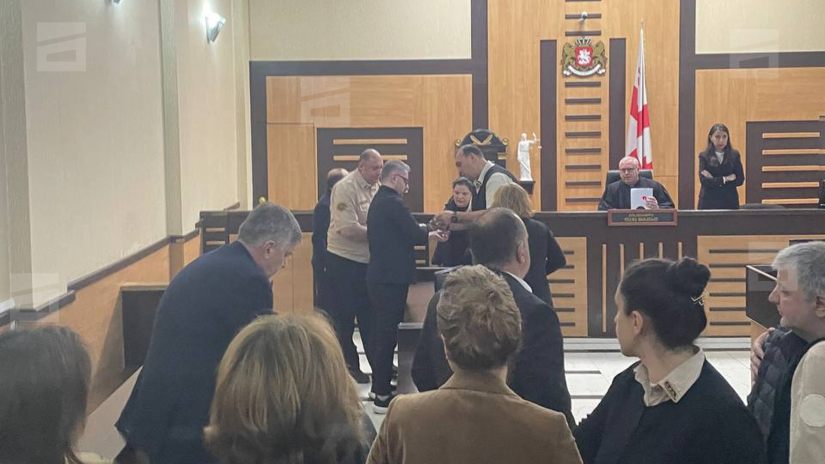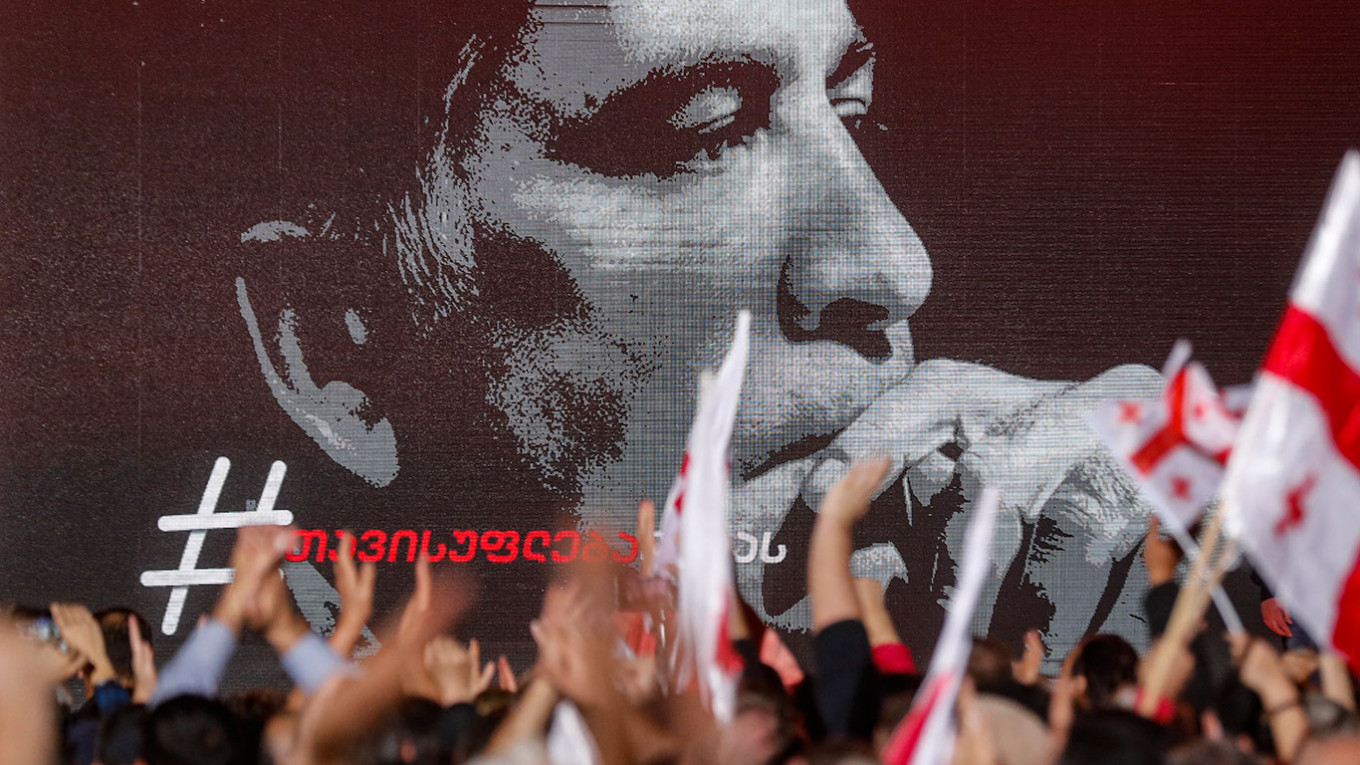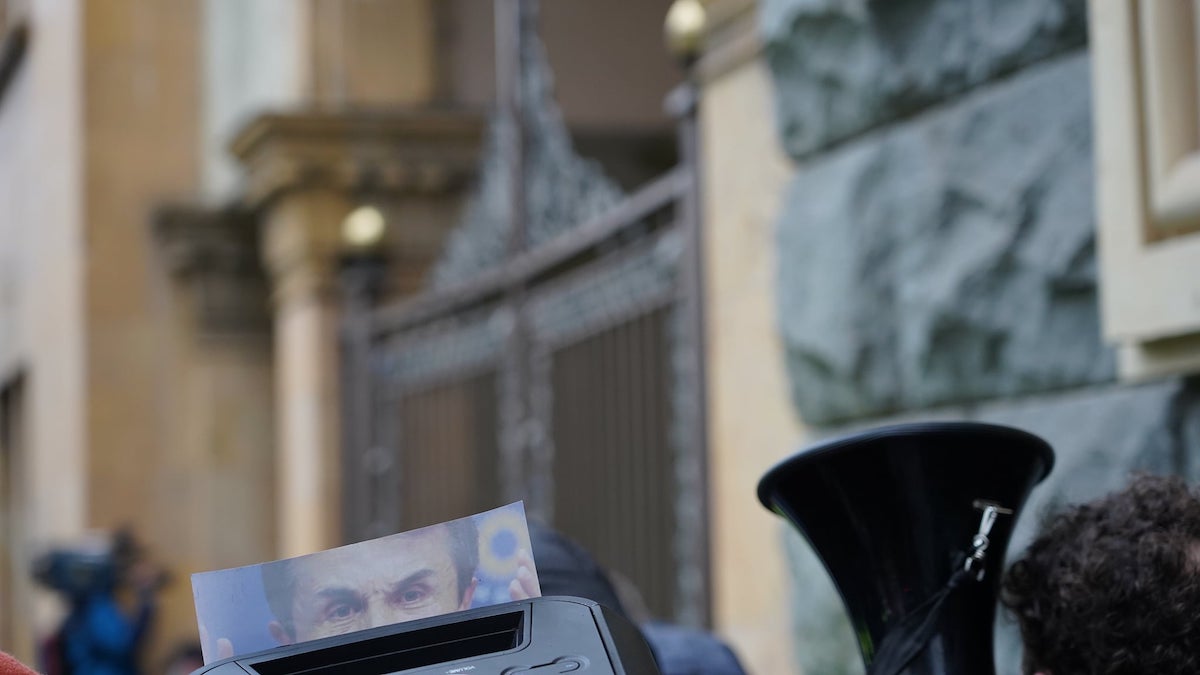What is the Georgian opposition's plan to change the government?
Georgian opposition’s plans
Anti-Western rhetoric, the discontent among partner countries, the law on foreign agents, the discrediting of the civil sector, restriction of freedom of the media – there is ample room to doubt where the ruling Georgian Dream party is leading Georgia.
The events of March 7-9 showed that it is possible to defeat the government before it goes too far.
What does the opposition think? What is their plan to change the government? Why can’t the opposition unite? To get answers to these questions, JAMnews talked to opposition parties.
What is the main problem of the country? What does the opposition think?
2023 and 2024 are two important dates for Georgia. At the end of this year, the country is waiting for a decision on the status of a candidate for the EU, and at the end of 2024 parliamentary elections are coming.
The government is doing everything so that the country does not receive a status. Even President Salome Zurabishvili said that the authorities are following the recommendations of the European Union formally.
The opposition says that now the most important thing for the country is to get the status of candidate country for the European Union, and everything must be done to make it happen.
But on what exactly to do, opinions are different and often contradictory.
There is also the issue of early elections in the discussion, but for many it is a bridge too far. Early elections are now seen by most as damaging the status quo.
So there is no single strategy on how to force Georgian Dream to fulfill the twelve EU recommendations and when to initiate a change of power.
What is the attitude of the opposition to obtaining the status of EU candidate?
Since the priority is obtaining candidate status, we asked the parties how they imagine this process.
The parliamentary opposition remains in parliament, and it was decided that it should be involved as much as possible in the work of sessions and committees. Opposition MPs believe that there are few resources to force the government to fulfill the recommendations, but they do exist. They explain that they are forced to cooperate with the allegedly pro-Russian Georgian authorities because this is what the West expects of them. And Georgian Dream should not be given a reason to blame the opposition for Georgia’s lack of candidate status. Such rhetoric is already being heard.
“We must not let the government rest, we must not allow it to only formally fulfill the recommendations. We need to tell the community and partners what’s going on inside. This is the strategy of the parliamentary opposition. And it yielded results during the fight against the “Russian law on foreign agents”,” Khatuna Samnidze, chairman of the Republican Party, believes.
“The opposition must do everything to take advantage of the opportunity that is now opening up for the country — it is necessary to work on deoligarchization and depolarization, to participate in the discussion of laws,” independent MP Teona Akubardia believes.
“And if the government continues to sabotage these processes, the population will clearly see who is opposed to the European perspective.”
- Risky de-oligarchization and unaccounted for recommendations – conclusion of the Venice Commission on Georgia
- Garibashvili’s Western partners respond: “Perhaps Europe is not really for you”
- Russian government media: Georgia is ready to break with the EU
- The war in Ukraine one year on, what is has changed in Georgia
The following opposition parties are active in parliament: Lelo, the United National Movement, and former Prime Minister Giorgi Gakharia’s party For Georgia.
The National Movement says that they have to keep working in this critical moment. Gakharia’s party hopes that candidacy can be achieved. Lelo says that the West should see its allies not only on the street, but also in parliament.
“The subtext of the statements is: “Work hard, show us that you are an alternative.” Changing the government has always been the goal, but now, to achieve this goal, Lelo has to work in parliament,” Lelo political secretary Irakli Kupradze says.
“Now we are in a force majeure situation, we are boycotting, but when necessary, we will get into discussions,” Irakli Pavlenishvili, a member of the political council of the United National Movement, says.
“The process of fulfilling the recommendations was supposed to be inclusive, but we saw that the non-governmental sector is not allowed. Our position was to place the responsibility for this process on the parliamentary opposition,” Berdia Sichinava, executive secretary of the For Georgia party, says.
This part of the opposition is sharply criticized. The non-parliamentary opposition believes that Georgian Dream cannot be forced to fulfill recommendations. It is said that talk about government collaborationism on the one hand and cooperation with it on the other is inconsistent and harmful.
“Forcing the authorities to do something will not work from the parliamentary rostrum. If Dream made concessions, it was owing to the public reaction. But there will be no reaction if there is ambiguity — on the one hand to accuse the government of collaborationism, and on the other hand to start discussions with it. The result of such ambiguity is, for example, the election of an ombudsman [a compromise figure agreed by the opposition] in parallel with the protest against the “Russian law” [on foreign agents],” Giorgi Noniashvili, a member of the European Georgia party, says.
Agmashenebeli Strategy, which is also parliamentary opposition, believes that without street protests it is impossible to force the authorities to do anything:
“Together with Lelo, we submitted six bills to the parliament, and all of them are on the table. And after that, who will say that we are not given status because we do not work together? As soon as the opposition realizes that the government is not able to fulfill its recommendations and withdraws from the working groups, then a common strategy will appear,” Paata Manjgaladze, a member of the Agmashenebeli Strategy, says.
The fulfillment of the recommendations and candidate status is nonsense for the opposition parties Droa and Girchi – More Freedom.
“Work on early elections, not announcing them, but work to ensure that the change of power occurs in a timely manner, is very important. You should not deceive people that this will be done, but I consider it legitimate to set the task of changing, entailing a chance of obtaining a status,” the leader of the Droa party, Elene Khoshtaria, says.
“Theoretically, we can imagine a street protest and complete consolidation, pressure from the West, and forcing the authorities to comply with the twelve points. But I can’t imagine how one can remain silent when [Irakli] Kobakhidze [chairman of the ruling party] offends someone every day. Or how can we force the authorities to take the right stance towards Ukraine? So I believe that obtaining a status is directly related to the change of power,” Zurab Japaridze, the leader of Girchi, says.
The Labor Party will not even consider this issue without a change of government.
“First of all we must change this regime,” Giorgi Gugava says.
Change of government. Early or regular scheduled elections.
The opposition does not have a single strategy on when and how to try to change power. A number of parties say that this requires early elections. Most, however, are against this idea. These people believe that early elections now will harm the opposition and prevent the country from obtaining candidate status.
This part of the opposition argues its point of view in different ways. Some say that the issue of early elections now will create false expectations in society and may cause great disappointment among citizens. Others believe that the opposition is not ready for elections, but at the same time, if it fails to change the government, this will lead the country to a dead end for a long time.
This part of the opposition does not believe that obtaining candidate status will strengthen the Georgian Dream, and the chances of its defeat in 2024.
Three parties are in favor of early elections: Droa, Girchi – More Freedom, and the Labor Party.
“Every day of my work is an effort to change the government through snap elections. But the main question is not whether the government will appoint them or not, but what these elections will be like, in what form we will meet at them,” Elene Khoshtaria says.
Zurab Japaridze says that Georgian Dream, like the Russian regime, will create many more problems: “They have not stopped their efforts, they have not disappeared anywhere and will continue to try to destroy independent media and the civil sector – with the same law [on foreign agents] or in other ways. They are trying to consolidate power, and it will be increasingly difficult to turn the tide.”
“We can’t waste time. How do you imagine two more years of this regime? Fulfilling the [EU] recommendations, getting better prepared [for the elections] is just a mirage,” Giorgi Gugava says.
All other party early elections are considered harmful.
“Early elections as a priority measure are beyond doubt, but now is not the time for that,” says Irakli Pavlenishvili. [However, the day after this interview, the leader of this party, Levan Khabeishvili, did not rule out on the air of the Formula TV channel that the demand for early elections would be announced at the April 9 rally].
“The country must necessarily receive the status of a candidate, which, of course, will lead to a change of power, and not vice versa. Otherwise, the process can be more destructive,” Berdia Sichinava says.
According to Khatuna Samnidze, it is political courage to talk about early elections now:
“According to rational calculations, now the opposition is not in such a form that if there were elections tomorrow, they would end with a change of power.”
Teona Akubardia also focuses on the opposition’s low rating and shattered reputation:
“In this situation, early elections do not mean a change of power. It is a preparatory process both in terms of trust and in terms of offering an alternative. We must prepare for the 2024 elections.”
Irakli Kupradze says that now the opposition should see the processes in chronological order:
“We have the opportunity to mobilize for a change of power, but because of this, Georgia may lose the chance for European integration. This will be ignoring the sincere request of the society,” Kupradze believes.
European Georgia looks at this issue differently than others. The party sees the main problem in the inconstancy of the opposition and in incorrect expectations, and not in who is in what form:
“Our application is much simpler and clearer. Our task is to defeat the government, no matter what. But you have to convince the people that this government is allowed to participate in the elections. You have to work on it,” Giorgi Noniashvili says.
“Of course, I do not believe that Ivanishvili will call elections for tomorrow. But if the opposition and the civil sector can win the elections, then Ivanishvili will be defeated in these elections. I believe in this, and not that the opposition is now in better shape, with proper infrastructure and training,” Zurab Japaridze says.
Cases of Saakashvili and Gvaramia. What are the opposition’s plans?
Former president Mikheil Saakashvili and former general director of Rustavi 2 TV channel Nika Gvaramia are political prisoners in the opinion of all opposition parties, except for the party of Giorgi Gakharia; Mikheil Saakashvili should be sent abroad for treatment, and Nika Gvaramia should be released — that is the position of the parties.
The opposition disagrees about the order in which these should happen.
In the case of Gvaramia, most of the opposition is cautiously optimistic about Salome Zurabishvili. They expect the president to pardon Nika Gvaramia.
Expectations towards Mikheil Saakashvili are more pessimistic, and the attitude is also different.
For the “United National Movement” the theme of Mikheil Saakashvili is obviously one of the leading ones.
“If the theme of Mikheil Saakashvili was not the leading one for the Nationalist Party, it would be a problem. He should be sent for treatment very soon, it cannot wait for a long time, for example, until the end of the year, he may not have that much time,” says Irakli Pavlenishvili.
In turn, the Agmashenebeli Strategy and the Labor Party consider it inappropriate to put these issues on the agenda now:
“They were addressed to the president, legal procedures have begun, and now there is no need to raise them artificially,” says Paata Manjgaladze.
For the Lelo party, the way to save Mikheil Saakashvili lies through Europe.
“Georgian Dream is not so rational as to expect the release of Mikheil Saakashvili or a reprieve. The Saakashvili factor is a divisive factor, Mechta understands this well and plays well with it. The Nationalist Party must understand that the key to Saakashvili’s survival lies in Europe. On the contrary, they believe that the release of Saakashvili is the key to Europe,” says Irakli Kupradze.
“I do not know what is achievable, I know what is necessary, it is necessary to resolve the Saakashvili-Gvaramia issue,” Elene Khoshtaria says, for whom the issue of Mikhail Saakashvili is not only moral, but also political.
Khoshtaria says that, in general, discussion of the Saakashvili factor should be given a lot of time, emotions should be allowed to subside and propaganda should be avoided: “For the discussion to be rational, a lot needs to happen. That being said, we can’t wait long because it’s about his life.”
“The struggle always makes sense, the struggle for the release of political prisoners also makes sense. But as long as this force remains in power, the prospects are very low,” Zurab Japaridze says.
European Georgia also considers the opposition’s strategy to force the government to release Saakashvili and Gvaramia a mistake.
“As soon as Misha was imprisoned, our position from the very beginning was that his release, like the release of Gvaramia, depended on a change of power. We must concentrate on this,” Giorgi Noniashvili says.
He considers the desire of the National Movement to make Mikheil Saakashvili not only a political exile but also a political leader wrong: “Although he is a political prisoner, he cannot be a consolidator. Society is not as worried about Saakashvili as his party wants it to be.”
Giorgi Gakharia’s party is the only one that does not give an unequivocal answer to the question of whether Mikheil Saakashvili is a political prisoner. It also does not consider it right to reduce this issue to the process of European integration. However, according to Gakharia, Saakashvili’s right to life and health should not be the subject of speculation by either the government or the United National Movement:
“We must look at this issue from a humanitarian point of view, in the 21st century there can be no questions about whether a person is healthy and whether he can be sentenced to prison. The state should say that it takes responsibility for his life. The national movement should not put pressure on the fact that until Saakashvili is released, the country will not receive the status [of an EU candidate]. This means pouring water on the mill of the government, which claims that for the opposition the West is equal to Saakashvili.”
Why can’t the opposition agree on a common strategy?
The rallies of March 7-9 showed that society-wide unity is possible. But can society unite without merely reacting to the government’s excesses?
“It doesn’t feel right, I don’t think it’s necessary. Everyone must be consistent in their actions, artificial unification is impossible,” Giorgi Noniashvili says.
- Gas, water cannons, arrests – Tbilisi against the law “on foreign agents.” Chronology and many photos
- Protests against the “law on foreign agents” continue in Georgia. Opinions of those opposed
- “Nobody needed this law on agents, it could have only come to be at Moscow’s behest” – President of Georgia
There are many reasons why the opposition cannot come together. Some people think it’s a clash of party ambitions and pride, some doubt the sincerity of the opposition, some say that it is difficult for the opposition to agree on common principles, and so on.
Arguments are also given that the parties will not be able to get along with each other within the same coalition. For example, the Droa and Girchi parties have questions for the Gakharia party, and the Gakharia party for the National Movement. European Georgia cannot imagine an artificial unity at all.
“Such a cacophony in the opposition has several causes. Ambition is very banal, but real. Also different perception of threats. In terms of frequency, the perception of the threat of Russian conquest is different for different parties,” Elene Khoshtaria says.
According to her, the opposition should be able to agree on a common task. However, “politics is complicated, it’s a matter of selfishness.”
“At this stage, everyone sees different priorities,” Khatuna Samnidze says, who believes that Ivanishvili’s goal was to fragment the opposition, and that he has achieved this goal.
Paata Manjgaladze says that not all those who call themselves opposition are, in fact, opposition.
Giorgi Gugava recalls the unification attempt during the last parliamentary elections:
“But many were not true to principles, and we have seen them end up in a rigged parliament.”
“Look how many independent deputies are in the parliament. This means that the parties have problems within their own parties, and not just with each other,” Teona Akubardia says.
Speaking of internal party problems, everyone again recalls the United National Movement. This party is now positioning itself as the most distant player. The Merabishvili-Kezerashvili factor significantly affected its reputation. Many say that if this party has informal management, they will avoid cooperation with it. The protest held on April 9 also raised questions.
“Attempts to “play” on certain dates is a crime. Such actions do not promote unification. Such actions add party issues to the main issue, which erodes the main goal,” Kupradze says. He believes that the National Movement is no longer the main player in the opposition.
For Giorgi Noniashvili, the main thing is unity of content. In his experience, union is often used by the big political actors against the weak ones, who, in fact, blackmail them. For example, he considers the statement of the National Movement that everyone who does not come to the April 9 rally to be traitors to be blackmail.
Despite such different positions, all parties argue that when the decisive moment comes, the opposition will be able to stand together. They believe public demand to be an important impetus. Everyone is thinking about consolidation. Most say the civil sector should also have a voice.
“Parties should restrain their ambitions, those who cause national pride should be in the forefront,” Kupradze believes.
“It is impossible to defeat the regime without general consolidation. In March, we saw what the formula for success is,” Zurab Japaridze says.
Elene Khoshtaria also believes that the opposition will be able to unite at the decisive moment:
“I don’t think there’s anything separating us. We manage to stick together at critical moments. But I would like us to work on the plan proactively, not reactively.”
In his opinion, unity often fails because the opposition is not ready for a long-term struggle:
“In 2013-2014, when we talked about strategy, and politicians found out that the problem cannot be solved in a week, that it could take years, they answered — why wait. And every time they chose short and wrong paths. But the long way, if you follow it consistently, can be shorter than the short way that you imagined,” he says, and gives an example:
“If the opposition had not stopped the boycott [meaning the boycott announced after the last parliamentary elections – JAMnews], the path to getting rid of this regime would not have been so long. It affected a lot, because then the government was at an impasse.”
The United National Movement confirms that now they are separate players and this is natural for the largest opposition party with its own problems and strengths. They are also not going to beg for unity from anyone:
“When we announced the rally, we said that it was a nationwide rally, not a party one. We have explained why the date of April 9 has ideological significance. When the goal is so important, complexes should be put aside. We are ready, if necessary, to put aside our personal grievances, but when they lash out at us like that, how can we say that cooperation with them is real?
Unification should take place around universal values that are common to all opposition parties. Pseudo-unions are very fragile,” Berdia Sichinava says.










